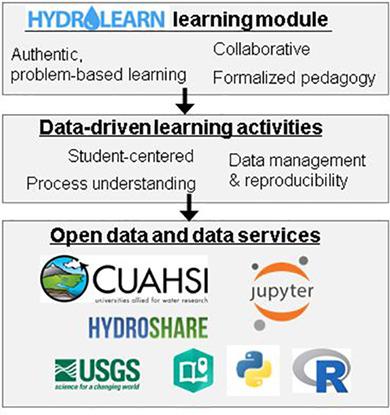当前位置:
X-MOL 学术
›
Hydrol. Process.
›
论文详情
Our official English website, www.x-mol.net, welcomes your
feedback! (Note: you will need to create a separate account there.)
An open web-based module developed to advance data-driven hydrologic process learning
Hydrological Processes ( IF 2.8 ) Pub Date : 2021-06-22 , DOI: 10.1002/hyp.14273 Belize Lane 1 , Irene Garousi‐Nejad 1 , Melissa A. Gallagher 2 , David G. Tarboton 1 , Emad Habib 3
Hydrological Processes ( IF 2.8 ) Pub Date : 2021-06-22 , DOI: 10.1002/hyp.14273 Belize Lane 1 , Irene Garousi‐Nejad 1 , Melissa A. Gallagher 2 , David G. Tarboton 1 , Emad Habib 3
Affiliation

|
The era of ‘big data’ promises to provide new hydrologic insights, and open web-based platforms are being developed and adopted by the hydrologic science community to harness these datasets and data services. This shift accompanies advances in hydrology education and the growth of web-based hydrology learning modules, but their capacity to utilize emerging open platforms and data services to enhance student learning through data-driven activities remains largely untapped. Given that generic equations may not easily translate into local or regional solutions, teaching students to explore how well models or equations work in particular settings or to answer specific problems using real data is essential. This article introduces an open web-based module developed to advance data-driven hydrologic process learning, targeting upper level undergraduate and early graduate students in hydrology and engineering. The module was developed and deployed on the HydroLearn open educational platform, which provides a formal pedagogical structure for developing effective problem-based learning activities. We found that data-driven learning activities utilizing collaborative open web platforms like CUAHSI HydroShare and JupyterHub to store and run computational notebooks allowed students to access and work with datasets for systems of personal interest and promoted critical evaluation of results and assumptions. Initial student feedback was generally positive, but also highlighted challenges including trouble-shooting and future-proofing difficulties and some resistance to programming and new software. Opportunities to further enhance hydrology learning include better articulating the benefits of coding and open web platforms upfront, incorporating additional user-support tools, and focusing methods and questions on implementing and adapting notebooks to explore fundamental processes rather than tools and syntax. The profound shift in the field of hydrology toward big data, open data services and reproducible research practices requires hydrology instructors to rethink traditional content delivery and focus instruction on harnessing these datasets and practices in the preparation of future hydrologists and engineers.
中文翻译:

一个开放的基于网络的模块,用于推进数据驱动的水文过程学习
“大数据”时代有望提供新的水文见解,水文科学界正在开发和采用基于网络的开放平台来利用这些数据集和数据服务。这种转变伴随着水文教育的进步和基于网络的水文学习模块的发展,但它们利用新兴开放平台和数据服务通过数据驱动的活动来加强学生学习的能力在很大程度上仍未得到开发。鉴于通用方程可能不容易转化为局部或区域解决方案,因此教学生探索模型或方程在特定环境中的工作情况或使用真实数据回答特定问题至关重要。本文介绍了一个开放的基于网络的模块,用于推进数据驱动的水文过程学习,针对水文学和工程专业的高年级本科生和早期研究生。该模块是在 HydroLearn 开放教育平台上开发和部署的,该平台为开发有效的基于问题的学习活动提供了正式的教学结构。我们发现数据驱动的学习活动利用 CUAHSI HydroShare 和 JupyterHub 等协作开放网络平台来存储和运行计算笔记本,允许学生访问和使用个人感兴趣系统的数据集,并促进对结果和假设的批判性评估。最初的学生反馈总体上是积极的,但也强调了一些挑战,包括故障排除和面向未来的困难以及对编程和新软件的一些抵制。进一步加强水文学学习的机会包括预先更好地阐明编码和开放网络平台的好处,结合额外的用户支持工具,以及将方法和问题集中在实施和调整笔记本以探索基本过程而不是工具和语法上。水文学领域向大数据、开放数据服务和可重复研究实践的深刻转变要求水文学教师重新思考传统的内容交付,并将指导重点放在利用这些数据集和实践为未来的水文学家和工程师做好准备。并将方法和问题集中在实施和调整笔记本上,以探索基本过程而不是工具和语法。水文学领域向大数据、开放数据服务和可重复研究实践的深刻转变要求水文学教师重新思考传统的内容交付,并将指导重点放在利用这些数据集和实践为未来的水文学家和工程师做好准备。并将方法和问题集中在实施和调整笔记本上,以探索基本过程而不是工具和语法。水文学领域向大数据、开放数据服务和可重复研究实践的深刻转变要求水文学教师重新思考传统的内容交付,并将指导重点放在利用这些数据集和实践为未来的水文学家和工程师做好准备。
更新日期:2021-07-06
中文翻译:

一个开放的基于网络的模块,用于推进数据驱动的水文过程学习
“大数据”时代有望提供新的水文见解,水文科学界正在开发和采用基于网络的开放平台来利用这些数据集和数据服务。这种转变伴随着水文教育的进步和基于网络的水文学习模块的发展,但它们利用新兴开放平台和数据服务通过数据驱动的活动来加强学生学习的能力在很大程度上仍未得到开发。鉴于通用方程可能不容易转化为局部或区域解决方案,因此教学生探索模型或方程在特定环境中的工作情况或使用真实数据回答特定问题至关重要。本文介绍了一个开放的基于网络的模块,用于推进数据驱动的水文过程学习,针对水文学和工程专业的高年级本科生和早期研究生。该模块是在 HydroLearn 开放教育平台上开发和部署的,该平台为开发有效的基于问题的学习活动提供了正式的教学结构。我们发现数据驱动的学习活动利用 CUAHSI HydroShare 和 JupyterHub 等协作开放网络平台来存储和运行计算笔记本,允许学生访问和使用个人感兴趣系统的数据集,并促进对结果和假设的批判性评估。最初的学生反馈总体上是积极的,但也强调了一些挑战,包括故障排除和面向未来的困难以及对编程和新软件的一些抵制。进一步加强水文学学习的机会包括预先更好地阐明编码和开放网络平台的好处,结合额外的用户支持工具,以及将方法和问题集中在实施和调整笔记本以探索基本过程而不是工具和语法上。水文学领域向大数据、开放数据服务和可重复研究实践的深刻转变要求水文学教师重新思考传统的内容交付,并将指导重点放在利用这些数据集和实践为未来的水文学家和工程师做好准备。并将方法和问题集中在实施和调整笔记本上,以探索基本过程而不是工具和语法。水文学领域向大数据、开放数据服务和可重复研究实践的深刻转变要求水文学教师重新思考传统的内容交付,并将指导重点放在利用这些数据集和实践为未来的水文学家和工程师做好准备。并将方法和问题集中在实施和调整笔记本上,以探索基本过程而不是工具和语法。水文学领域向大数据、开放数据服务和可重复研究实践的深刻转变要求水文学教师重新思考传统的内容交付,并将指导重点放在利用这些数据集和实践为未来的水文学家和工程师做好准备。











































 京公网安备 11010802027423号
京公网安备 11010802027423号